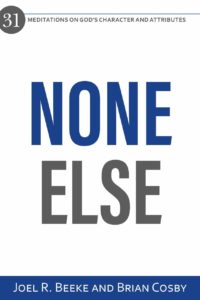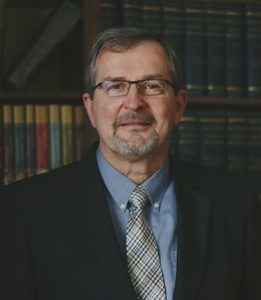
God is God.
Be still, and know that I am God: I will be exalted among the heathen, I will be exalted in the earth. — Psalm 46:10
Prayer
Gracious Lord, Thou art God and I am not. Thou art infinite and I am finite. Thou art powerful and I am weak. As I meditate upon Thy character, apply the truths of Thy Word to my life by Thy Spirit. Bring to my mind areas in my life that need change, encouragement, and peace. I desire to exalt Thee now as I meditate on the truth that Thou art not just the God of the universe—eternal and sovereign—but my God. As Thy sheep, I come to Thee, my Shepherd, in search of green pastures and still waters; restore my soul. In Christ’s name I pray. Amen.
Biblical Perspective
“In God we Trust” is printed on the back of every U.S. dollar bill (at least for now). But who is the God we “trust”? And who are the “we” who trust that God? Many people believe that the God of the Christian faith is the same God as the god of the Islamic faith or the Hindu faith or any number of other religions. But the God of Scripture—the true and living God—is altogether different.
One of the fundamental differences is that we believe in the God who eternally exists as three persons, as God the Trinity: God the Father, God the Son, and God the Holy Spirit. These three persons share the same essence and enjoy perfect unity forever (Heb. 1:3). None is greater than the other and none is inferior, and they are not three gods. He is one God (Deut. 6:4), who exists in three persons forever (Matt. 28:19; 2 Cor. 13:14).
In Psalm 46:10, God exhorts His people: “Be still, and know that I am God.” The context is one of God bringing battle and war to an end. He then turns from the indicative—what He’s done—to the imperative—what He requires of His people. “Be still,” then can be viewed as a ceasing from battle. As you meditate on this verse, there are a few things to keep in mind. God the Father planned our redemption. God the Son accomplished our redemption. God the Holy Spirit applies our redemption. Share on X
First, this isn’t simply a good suggestion; it’s a command! In other words, this is a matter of obedience to God. But as much as it brings God glory, we partake of Him in this delightful duty.
Second, God tells us to “be still.” As mentioned, the context is one of battle. But how may this apply to you? Is there a sense in which you are “fighting” for reputation, significance, or any number of selfish endeavors? Indeed, stillness is a resting from sin and a resting in God in the midst of busy schedules. Between family, school, jobs, sports, hobbies, and friends, being still seems very unfamiliar to many of us. The world is continually enticing us to fill our schedules and calendars with more and more. In addition, the idea of a Sabbath rest on the Lord’s Day (Sunday) has virtually been lost in the dust of cleaning the house, homework, or football. We need to hear this message of stillness before a holy and gracious God.
Third, we are commanded to “know” something about God. The kind of knowing here isn’t an empty knowledge, but a faith-filled, loving knowledge. In the New Testament, Paul prays for the Philippian church by saying, “And this I pray, that your love may abound yet more and more in knowledge and in all judgment” (Phil. 1:9). Even the demons believe and know that God is God (James 2:19), but God calls us to a knowledge of Him that draws our affections and faith together into a life that glorifies and exalts Him.
Fourth, God tells us to know that He is God. According to the Bible, this means that He is perfectly and completely sovereign, holy, wise, just, good, gracious, loving, and faithful (among many other characteristics). And He commands us to know Him. Jesus echoed this when He prayed, “And this is life eternal, that they might know thee the only true God, and Jesus Christ, whom thou hast sent” (John 17:3).
Finally, Psalm 46:10 tells us that God will be exalted among the nations and in the earth. This not only happened in its immediate Jewish context, but has continued to happen down through the ages and will find its final expression when we gather around the heavenly throne as people “of all nations, and kindreds, and people, and tongues” (Rev. 7:9).
God the Father planned our redemption. God the Son accomplished our redemption. God the Holy Spirit applies our redemption. Though we deserve death as the payment of our sin (Rom. 6:23), God is gracious and has sent His only Son to be our substitute on the cross. Though we have been spared eternal separation from God, He did not spare His own Son, but gave Him up for us all (Rom. 8:32).
Reflection Questions
- What are some initial thoughts that come to your mind when you think of the phrase, “God is God”?
- What do you think Luther meant when he said, “Letting God be God is more than half of all true religion”?
- This passage tells us to “be still.” Do you find that your life is too busy? Do you find it difficult to spend time with God, to read His Word, or to pray? Are there activities that you could cut out for a season?
- What are some things that you could do to increase your knowledge of and love for God? Are you willing to make these things a priority in your daily life? How?
- How might the sin of pride hinder your recognition that God is God?
- What do you think it means to “exalt” God at school, at work, or in your home?
- How is it that God can say with full confidence, “I will be exalted”? What is at least one thing this says about His character?
Digging Deeper
- S
 ome other Scripture passages on the Godhood of God include Deuteronomy 4:35; 32:39; Psalms 18:31; 100:3; Isaiah 44:6; 45:5; Joel 2:27.
ome other Scripture passages on the Godhood of God include Deuteronomy 4:35; 32:39; Psalms 18:31; 100:3; Isaiah 44:6; 45:5; Joel 2:27. - That God exists as three persons in one Godhead rightly points to the truth that He is relational. Genesis 1:27 says that we are created “in his image,” which means (in part) that we are created for relationship—with God and with others. The unity of the community that we share with one another as the church should reflect the unity of the community of the Trinity.
- The development of Trinitarian theology took center stage over the first five centuries of the Christian church. The result of these labors can be found in confessions like the Nicene Creed (325/381 AD) or the Chalcedonian Creed (451 AD).
- Many people today want to say that God is only loving or only gracious. But God is perfectly loving and perfectly gracious. He is also perfectly just and perfectly holy. We cannot limit God’s attributes to a few things we think are nice. Rather, we must adjust our thinking and pattern our minds after God’s Word.
- See also Gerald Bray, The Doctrine of God (Downers Grove, IL: InterVarsity Press, 1993); R. C. Sproul, The Character of God: Discovering the God Who Is (Ventura, CA: Regal, 1995).
**This article is adapted from Joel Beeke and Brian Cosby’s None Else: 31 Meditations on God’s Character and Attributes (Reformation Heritage Books, 2020).**


